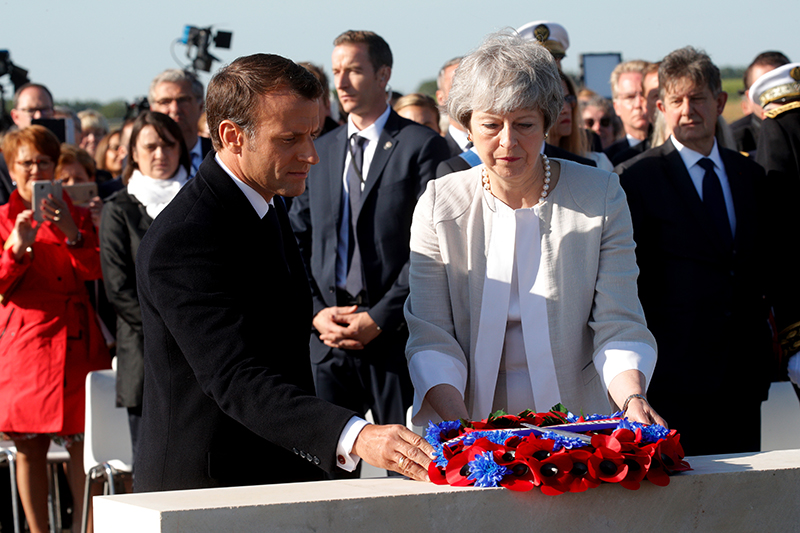
CAEN, France: US President Donald Trump landed in France Thursday to join other world leaders on the beaches of Normandy in a tribute to the veterans and dead heroes of the D-Day landings that shaped the outcome of World War II. Despite being largely blamed for growing international discord, Trump headed to join in the attempted show of transatlantic harmony on the 75th anniversary of the assault.
“Heading
over to Normandy to celebrate some of the bravest that ever lived,” the US
leader tweeted on arrival in France. “We are eternally grateful!” French
President Emmanuel Macron and British Prime Minister Theresa May earlier paid
tribute to D-Day veterans at the start of Thursday’s commemorations for the
soldiers who surged onto the Normandy beaches on June 6, 1944. On an occasion
mixing high politics with poignant historical remembrance, Macron met first
with May at Ver-sur-Mer, where they laid the first stone for a new British
memorial to fallen soldiers.
“Standing
here as the waves wash quietly onto the shore below us, it’s almost impossible
to grasp the raw courage it must have taken that day to leap from landing craft
and into the surf, despite the fury of battle,” May said. Under a bright blue
sky, she finished her speech by addressing the assembled veterans, whose
numbers dwindle with each major anniversary.
“I
want to say the only words we can: thank you,” she said in her final
international appearance before she steps down as leader of the Conservative
party on Friday.
Britain’s
delayed departure from the European Union, which has cost May her job as prime minister,
is just one of many rifts that has opened recently among Western allies, whose
alliance forged in World War II is under unprecedented strain.
The
man blamed for most of the discord, Trump, was set to arrive in northern France
for a ceremony at the US military cemetery at Colleville-sur-Mer
overlooking Omaha Beach where 9,400 US servicemen are buried.
Overlooked heroes
Both
leaders will give speeches, while the French president will also bestow the
Legion d’Honneur, France’s highest honor, on five American veterans. Macron and
Trump—whose once warm relations have chilled due to mounting public
disagreements on Iran, climate change and trade—will then meet for private
talks followed by a working lunch. Macron will end the day with an homage at Colleville
Montgomery for the Kieffer Commando, the only French soldiers to storm a
Normandy beach on D-Day which opened a new front against the Nazis and led to
the liberation of France and much of western Europe.
The
177 men, who were given the honor of being the first to touch French soil, had
long been little more than a footnote in France’s official histories of the
war—an oversight officials in Macron’s office said the president is eager to
correct. Canadian Prime Minister Justin Trudeau will attend a ceremony at Juno
Beach, where Canadian forces were in charge of the assault.
D-Day
is seen by many as one of the great symbols of transatlantic cooperation, as
young American and Canadian servicemen sacrificed their lives in the struggle
to end the Third Reich’s grip on Europe. The June 6, 1944 landings by Allied
forces on five Normandy beaches were the biggest naval operation ever in terms
of the number of ships deployed and the troops involved.
By
the end of what became known as “the longest day”, 156,000 Allied troops and
20,000 vehicles had landed in Nazi-occupied northern France despite facing a
hail of bullets, artillery and aircraft fire.
‘Shared values’, strained ties
Tens
of thousands of French and foreign visitors, many donning WWII uniforms or
driving vintage military vehicles, have converged on Normandy to honor the
veterans. Trump arrived in France from a three-day state visit to Britain,
where he attended a ceremony in Portsmouth to mark D-Day alongside Queen
Elizabeth II and over a dozen other world leaders. In a joint proclamation, the
16 nations present in Portsmouth affirmed their shared responsibility to ensure
that the horrors of World War II are never repeated.
They
reaffirmed their commitment to “shared values” and vowed to work together to
defend freedoms “whenever they are threatened”. President Vladimir Putin, who
was invited in 2004 on the 60th anniversary of the invasion, did not
receive an invitation to either ceremony, a snub indicative of the West’s
strained relations with Russia. Russia’s foreign ministry said Wednesday that
the Allied invasion on D-Day did not determine the course of World War II and
its importance should not be exaggerated. Spokeswoman Maria Zakharova told
journalists that it was the efforts of the Soviet Union, which entered the war
in 1941, that secured victory.--AFP










